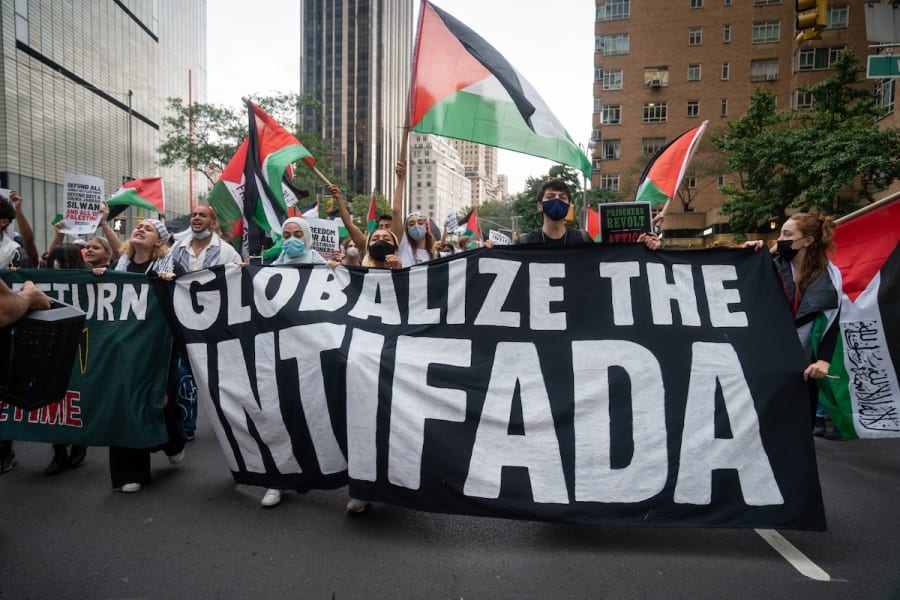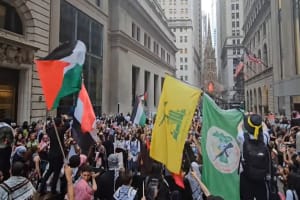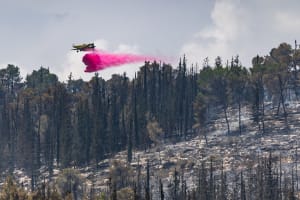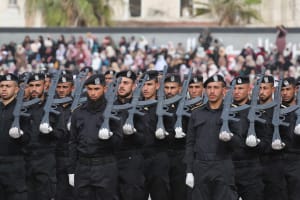'Globalize the Intifada' calls intensify at anti-Israeli protests, but what does 'intifada' really mean?

Revolutionary groups like the Socialist Worker have been handing out “Globalize the Intifada” signs to people protesting against Israel’s war with Hamas. Though many have been caught on camera brandishing signs with the slogan, while admitting they have no idea what the Arabic word intifada means, plenty of pro-Palestinian activists around the world will tell you it simply means “uprising.” Is that correct?
On the one hand, the word literally translated means “shaking off” or “uprising,” but on the other, it has come to refer to two intense seasons of violence and terrorism targeting Israeli citizens.
The First Intifada was characterized by a wave of protests, civil disobedience and violent attacks from 1987-1990. The Second Intifada lasted five years, between 2000 and 2005 and became known as the Al-Aqsa Intifada, named after the mosque on the Temple Mount, in which Israel experienced a wave of suicide bombings.
When protesters chant, “Long live the Intifada!” Israelis hear a battle cry and a call for their murder. When the streets of London, Melbourne, and New York are full of signs reading, “Globalize the Intifada,” Jewish people in the diaspora are understandably alarmed. Given the horrific events of the First and Second Intifada, that slogan is effectively a call for violence and attacks against Jewish institutions, homes and lives.
The Arabic language news channel Al Jazeera, known for its anti-Israel stance, explains that “in the Palestinian context, it is understood to mean a civil uprising” and that the First Intifada was directed by the Unified National Leadership of the Uprising, “a coalition of Palestinian political factions committed to ending the Israeli occupation and establishing Palestinian independence.” Tragically, it was primarily very young Palestinians who were encouraged to carry out these murderous attacks against Israeli civilians. The attacks would almost inevitably lead to their death, either at the hands of security forces, or even their own, in the case of suicide bombings.
During the First Intifada 100 Israeli civilians and 60 soldiers were killed. The Second Intifada was far more brutal with over 1,000 Israelis killed, as well as several thousands severely wounded.
The Palestinian side also suffered during these periods of “uprising” with over 3,000 killed, many of whom were actively involved in violence. In addition, Palestinian noncombatant deaths during IDF counterterrorism operations were largely a result of the terrorists' practice of operating from within densely populated civilian areas, in a similar way that Hamas and Palestinian Islamic Jihad are fighting in Gaza during the current war.
To protect citizens and restore order, Israel enacted several measures, such as closing universities, arresting and deporting activists, and installing checkpoints to prevent weapons and bombs from being smuggled into the country. The First Intifada began in Gaza and ended with the signing of the Oslo Accords in 1993. While there is no specific event that ended the Second Intifada, the building of the security wall saw a great reduction in the number of attacks, and the wave of violence associated with the intifada came to something of an end by 2005.
The Second, or “Al-Aqsa” Intifada followed then-Prime Minister Ariel Sharon’s visit to the mosque compound. Sensitivities about the Temple Mount area often lead to violence and this was no exception. After serious clashes between Israeli security forces and Palestinian protesters, the violence spread throughout Judea and Samaria and there was a steady stream of indiscriminate attacks on civilian targets within Israel. After each fatal attack, Israeli radio stations played songs to mourn the dead, and these songs appeared to be playing for years on end. Given the size of Israel’s population, almost everyone had a connection to someone murdered in the Second Intifada.
Suicide bombers targeted buses full of children on their way back from school, busy restaurants and nightclubs full of teenagers were attacked and nothing seemed to be beyond the pale. Israeli civilians of all ages, Jewish and Arab, were murdered almost every week.
Even in the diaspora, the memories, particularly of the Second Intifada, remain fresh, painful, and evoke strong feelings.
Eliana Goldin, a student at Columbia University, explains: "The word intifada was only associated with death and terrorism and destruction. So 'intifada' still feels just as charged as if someone were to say Holocaust.”
A call for globalized violence against Jewish people went out soon after October 7 in issue 413 of “Al-Naba,” a weekly magazine by ISIS which contained an infographic titled: “Practical ways to support Muslims in Palestine.”
The magazine encouraged attacks not only in Israel but on Jewish people in general, with the aim of “returning its land to the House of Islam again.” Suggestions of how to carry out these attacks included targeting Jewish neighborhoods, attacking Jewish embassies with burning and vandalism, targeting synagogues, as well as attacking Jewish economic interests globally.
To many Palestinians, the slogan may be the cry for change, albeit by any means necessary. To Jews, “Globalize the Intifada” is a call to indiscriminate violence and murder against Jewish people all over the world.

Jo Elizabeth has a great interest in politics and cultural developments, studying Social Policy for her first degree and gaining a Masters in Jewish Philosophy from Haifa University, but she loves to write about the Bible and its primary subject, the God of Israel. As a writer, Jo spends her time between the UK and Jerusalem, Israel.
You might also like to read this:














